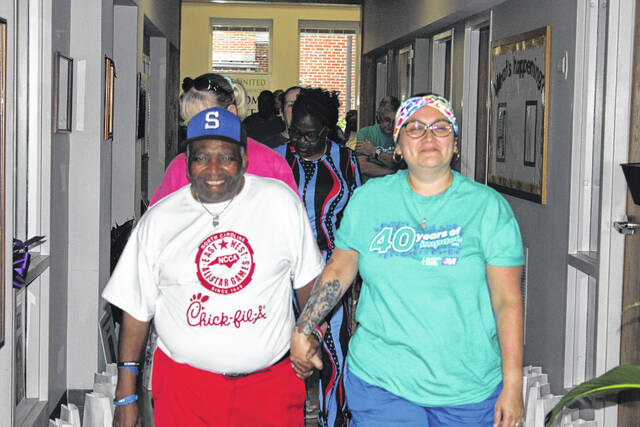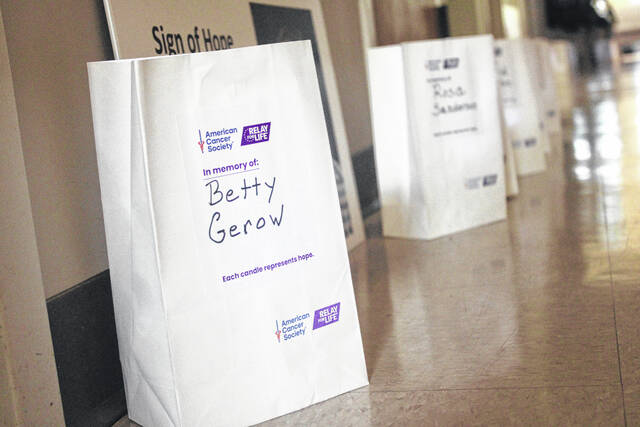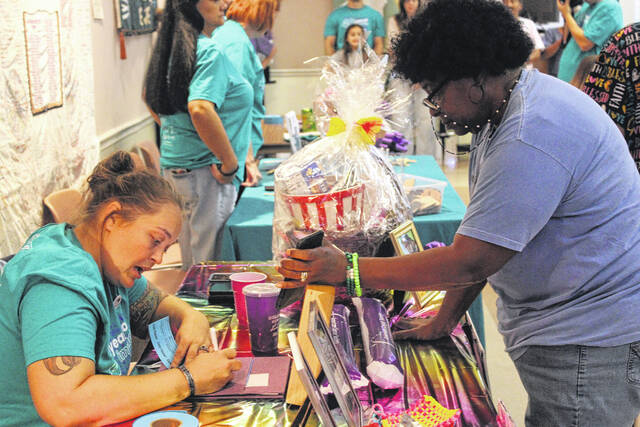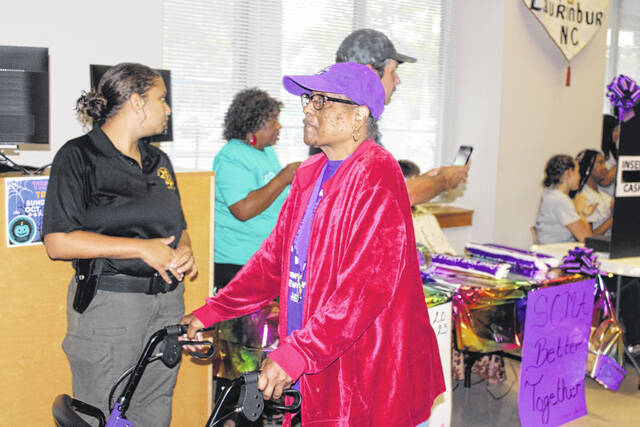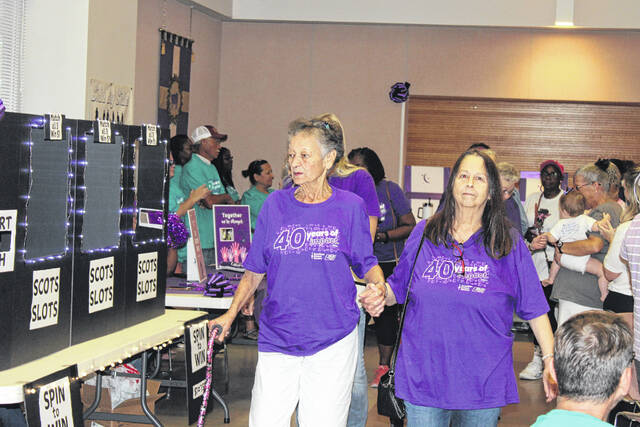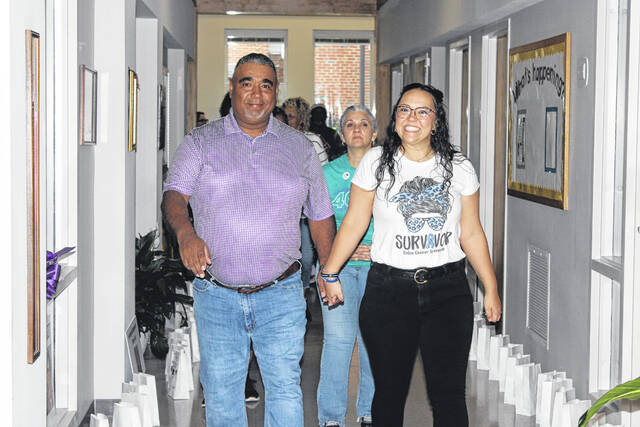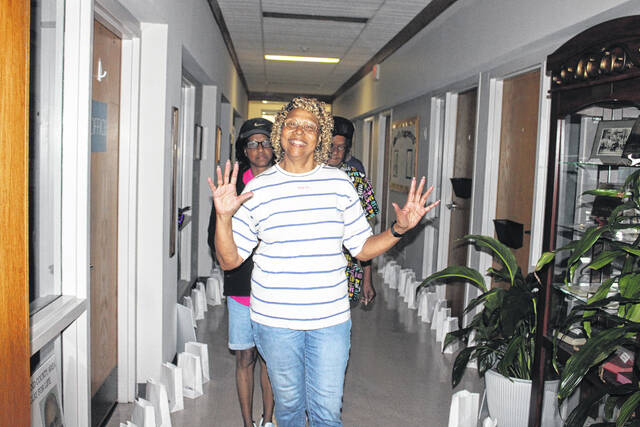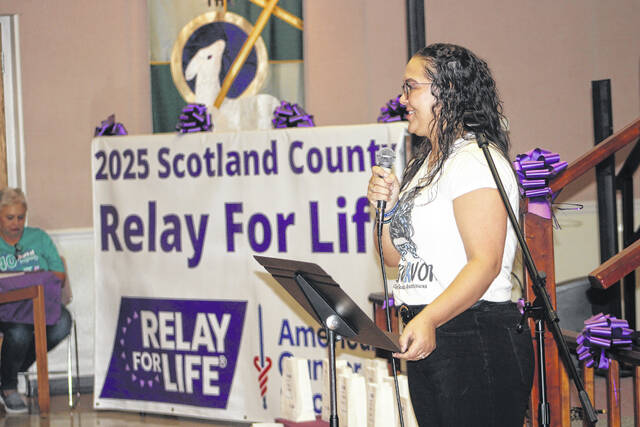
Chelsey Hunt Dial, a two-time stage 3 colon cancer survivor, shares her story with attendees at the 29th Relay for Life of the Scotland County Area.
Tomeka Sinclair | The Laurinburg Exchange
LAURINBURG — Chelsey Hunt Dial was 29 when she received a diagnosis that would change her life: stage 3 colon cancer. Twice.
“A lot of people say you don’t get colon cancer at 29, but I did. I used to ask the Lord, ‘Why me?’ and He said, ‘Why not?’” Dial, a registered nurse at the Scotland Health Cancer Treatment Center, told attendees at the 29th Relay for Life of the Scotland County Area held Friday.
Dial described how facing the “C word” shifted her perspective.
“When you find out you have the ‘C’ word, a lot of people associate it with death. It was in finding out I had the ‘C’ word that I started living,” she said.
She said surviving cancer taught her to see every day as a series of small victories.
“I tell my patients, just because your journey may be different than everybody else’s, every day you’re on this side, every day you live with a cancer diagnosis, you are a cancer survivor,” Dial said.
“I’m standing here tonight because I said yes. I said yes to prayer. I said yes to a cure. I said yes to the fight, and I’m saying yes to remembering, because all of those who have gone before us did not lose their battle for no reason. We must continue to fight for them,” she added.
The threat of inclement weather moved this year’s Relay indoors to the First United Methodist Church Fellowship Hall for an abbreviated event, but cancer survivors, caretakers, and health care heroes still gathered to spread awareness. This year’s theme was Lighting the Way for a Cure.
“Just as you see all of these luminaries shining around you, our community shines with determination and hope, guiding us to the day when cancer is defeated once and for all,” said Stewart Thomas, the organizer of the local event.
Thomas emphasized the mission of Relay for Life: “Relay is not about how long we gather but about how we gather and why we gather. We gather to honor survivors, we gather to remember loved ones, and we gather to fight back at cancer. Relay for Life is a community of hope. It is about encouraging survivors and strengthening the memories of loved ones. Everyone has been touched by cancer in some way. Tonight, even though our program may be brief, its meaning is eternal.”
Survivors and caregivers lapped the halls of the church, flanked by luminaries bearing the names of those touched by cancer, while the crowd cheered them on.
The Scotland County Relay for Life has celebrated 29 years locally and is part of a worldwide movement that has reached a 40-year milestone. In those 29 years, Scotland County has raised $5.7 million to fight cancer. Worldwide, Relay for Life has raised more than $7 billion to support research, patient services, and advocacy.
“What began as one person’s vision has become a worldwide symbol of determination and unity in the fight against cancer,” Thomas said.
Richard Averitte, executive director of the American Cancer Society for Central and Eastern North Carolina, highlighted services funded by Relay proceeds that stay local, including the Hope Line hotline, which offers support to anyone at any stage of their cancer journey.
“Anyone at any time can talk about their cancer journey. This number gets the most action between 10 p.m. and 2 a.m. You wake up in the middle of the night and say, ‘Oh my God, I got cancer. I just want to talk to somebody,’” Averitte said.
He also spoke about the Hope Lodge, which provides a home away from home at no charge for patients and caregivers traveling for treatment, and volunteer opportunities that assist with patient transportation.
The American Cancer Society also advocates for cancer patients, Averitte said. “We were the largest live lobbyist group that helped pass Medicaid expansion a couple of years ago for 600,000 North Carolinians. We’re fighting to keep those rights.”
“Cancer doesn’t care who’s elected, cancer doesn’t care what’s going on on Wall Street, cancer doesn’t care that a hurricane is coming. It doesn’t stop. That’s why we’re here. I hope to one day be out of a job because we cured cancer,” he said.

